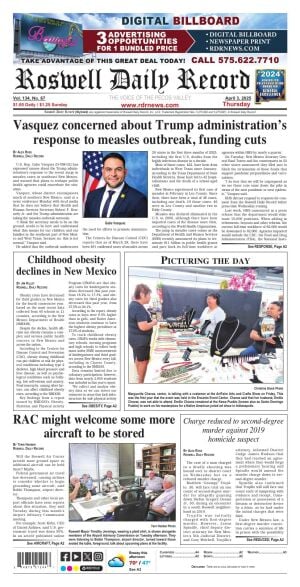Michelle Miller, known online as “The Farm Babe,” gave an entertaining and engaging presentation at the Roswell Chamber of Commerce’s Rise with Roswell 2025 Agricultural Breakfast early Thursday morning at the Eastern New Mexico State Fairgrounds.
The well-attended event brought out a large crowd of local farmers and ranchers as well as many businessmen and elected officials. Many 4-H and FFA students were also on hand to hear the guest speaker and partake of the breakfast.
After opening ceremonies and Chaves County Manager Bill Williams’ reading of a proclamation by the Chaves County Board of Commissioners proclaiming Thursday “Agricultural Appreciation Day,” the chamber’s President and CEO Andrea Moore introduced Miller as a “full-time advocate of agriculture and dedicated myth-buster” whose online presence attracts more than 5 million views annually.
Miller began by telling the attendees about her first impression of visiting Roswell, saying her friends had told her that Roswell was “the alien town.”
“My expectations were so surpassed,” she said, and seeing Roswell’s collection of alien-themed museums and exhibits, as well as talking to people about their alien abduction stories, was “super fun.”
The main theme of Miller’s presentation was about the importance of farmers and ranchers cultivating connections and advocating for the agricultural community.
“We are here today to celebrate the resilience and vitality of farmers and ranchers,” she said.
Miller shared some of her background, saying she grew up in Oshkosh, Wisconsin, and while she didn’t grow up on a farm, many of her friends were from farms. She became involved in 4-H and such activities as horseback riding.
However, she didn’t follow her high school counselor’s advice to seek a career in agriculture or as a veterinarian.
Instead she moved to Los Angeles, got a degree in fashion and worked for a fashion house, before moving to Chicago, where she had a sales career.
During that time, she said she was exposed to misinformation about such things as gluten and genetically modified organisms (GMO), and became an anti-GMO activist.
Eventually, she said she got fed up with the “big-city life,” and moved to Pensacola Beach, Florida, where she tended bar.
There she met an “Iowa farm boy” and ended up moving to Iowa and becoming a farmer.
“Sometimes when you hit on the bartender, it actually works,” Miller quipped.
She started a blog on what was happening on the farm.
“Unfortunately, I didn’t get a husband out of the deal, but I did get a great career,” Miller said.
She said she moved back to Florida and lived on a timber farm while becoming a social media influencer, a podcaster, an author and a speaker advocating for farmers.
“My passion comes from wanting to tell the farmer’s story and wanting to debunk all the myths that so many people are exposed to,” she said, “but they don’t always get to hear from a real farmer.”
“There is a lot of money to be made off of misinformation,” Miller said.
She told the story of messaging the “Food Babe” who was campaigning against GMOs as being drenched in toxic chemicals.
“She’s probably one of the biggest sources of misinformation out there,” Miller said.
She said she messaged the Food Babe on social media.
“We grow GMOs on our farm,” she said.
In her message she pointed out that GMOs were invented so farms could reduce pesticide use, and are only sprayed with pesticides one or two days a year.
Miller told the Food Babe she would love to have a conversation.
“Instead of engaging with me in conversation, she blocked and banned me,” she said.
Miller said she then discovered a social media group called “Banned by the Food Babe.”
“So I am going to be “The Farm Babe,” she said. “It started out as a joke.”
She created her social media platform because she realized farmers need a voice, Miller said.
Part of the importance of advocating for agriculture is getting the truth from actual farmers and for farmers to advocate for the industry directly, she said.
“People want to hear your story, so just remember that as you’re going about your advocacy,” Miller said.
She said farmers can advocate in many different ways, whether it’s by creating a social media account, a podcast or supporting such things as Ag in the Classroom and agricultural tourism, also known as “agritourism.”
Miller offered some tips on how farmers can advocate, including that they should have empathy.
“Treat anybody as if you would treat your own best friend, and put yourself in their shoes,” she said. “Just because people are incorrect about a topic doesn’t mean they’re a lost cause.”
At one point, Miller displayed a slide of New York City, noting how many people lived there.
“Every single one of them is alive because of you, because of farmers and ranchers,” she said. “Every single person in New York City has clothing, food, drinks to stay alive, because agriculture is so vital, and that’s because of you.”
Miller said there is no wrong way to advocate for agriculture no matter how much time there is to do it.
“Be yourself, do what works best for you, find your voice and your personality,” she said. “Always be kind, but really share your expertise.”









